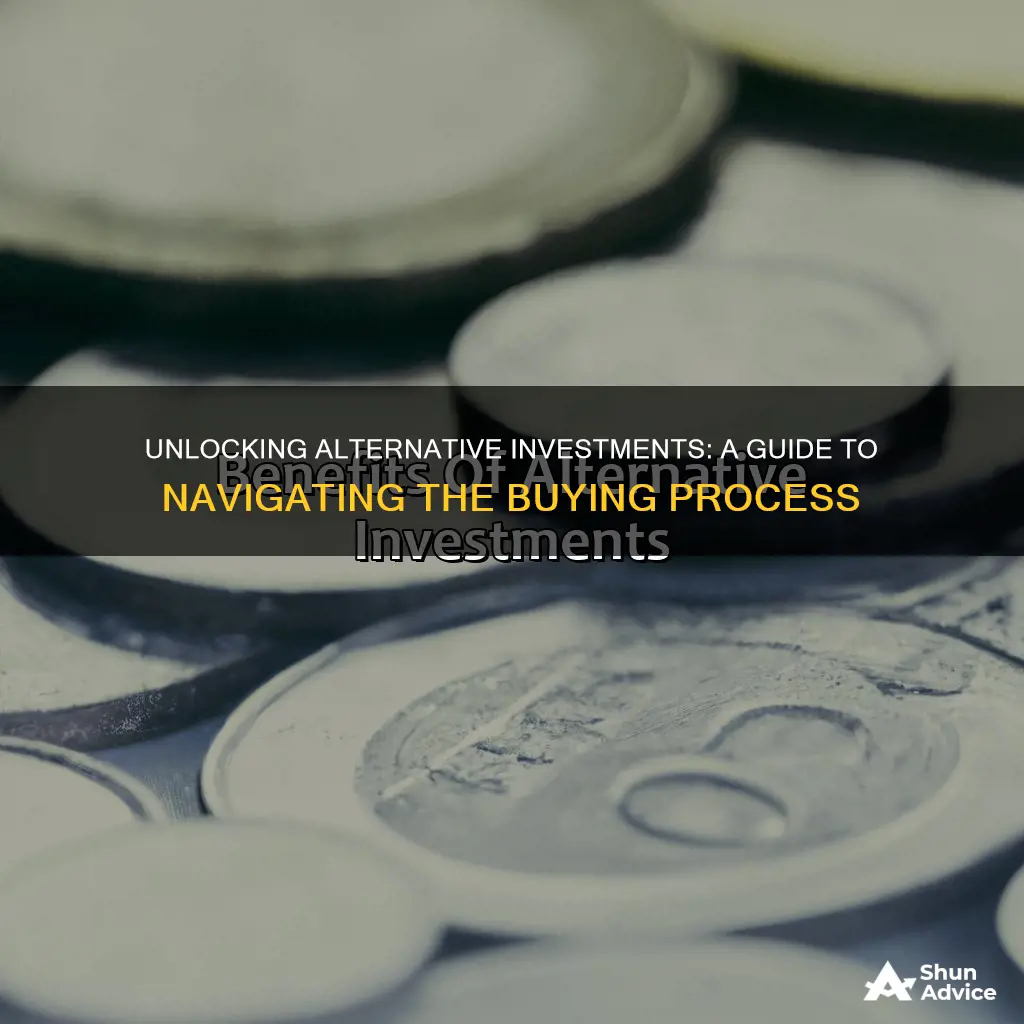
Alternative investments are assets that do not fall into the traditional categories of stocks, bonds, and cash. They include private equity, venture capital, hedge funds, managed futures, commodities, real estate, art, and cryptocurrencies. These investments are generally less liquid than traditional investments, but they may offer diversification and higher returns.
Before investing in alternative assets, it is important to understand how they work and their potential risks and rewards. Some alternative investments, such as real estate, can provide ongoing cash flow and appreciation potential. Others, like gold and precious metals, are considered inflation hedges.
When considering alternative investments, investors should evaluate their liquidity needs, time horizon, risk tolerance, portfolio size, and objectives. It is also crucial to conduct extensive due diligence to avoid scams and ensure the legitimacy of the investment opportunities.
| Characteristics | Values |
|---|---|
| Regulation | Alternative investments are less regulated by the SEC than traditional investments. |
| Liquidity | Alternative investments are illiquid and cannot be easily converted to cash. |
| Correlation to standard asset classes | Alternative investments have a low correlation to standard asset classes. |
| Accessibility | Alternative investments are becoming more accessible to retail investors. |
| Structure | Alternative investments vary in their structure. |
| Risk | Alternative investments are considered riskier than traditional investments. |
| Returns | Alternative investments have the potential for higher returns than traditional investments. |
| Tax implications | Alternative investments may have additional tax requirements. |
| Fees | Alternative investments often have higher fees and expenses than traditional investments. |
What You'll Learn

How to buy alternative investments through crowdfunding
Crowdfunding has become an increasingly popular way for entrepreneurs and start-ups to raise capital for their businesses. It has also opened up alternative investment opportunities for non-accredited investors.
Crowdfunding is a way for start-ups to raise capital by selling shares to a large number of individual investors. It allows investors to put relatively small amounts of money into a platform while gaining the advantage of investing in several ventures.
Sign Up for an Account
Sign up for a reputable alternative investing platform, such as Fundrise, Yieldstreet, or Crowdstreet, and create an account. You will be required to verify your identity with a government-issued ID.
Link a Bank Account
Link a payment method to your account to add funds for purchasing alternative investments. Different exchanges may accept different payment methods, so it is important to check what is accepted by the exchange in your jurisdiction.
Select Investment and Transfer Funds
Choose the asset or assets you want to invest in and indicate the number of shares and type of investment. Transfer the funds from your linked bank account. If the investment doesn't use all your transferred money, the excess will remain in your account for future investment opportunities.
Understand the Risks
Investing in early-stage companies is risky. According to the Small Business Administration, less than 50% of businesses make it to year five. There is also a potential for loss, lack of liquidity, platform risks, and due diligence risks.
Types of Crowdfunded Investments
Equity Crowdfunding
Equity crowdfunding is when you invest in equity in a company, typically a start-up. The most common way to do this is through a convertible note, which is a debt instrument that can convert to equity at a specific milestone or time.
Real Estate Crowdfunding
Real estate crowdfunding gives investors the opportunity to invest in real estate in multiple ways, for low minimums. There are three major ways to invest: direct equity, preferred equity, and debt.
Peer-to-Peer Lending
Peer-to-peer lending is the oldest form of crowdfunding, with Prosper and Lending Club being the main companies in the space. These platforms allow loans for various purposes, and the amount of the loans is typically less than what you'll see in the real estate space.
Specialty Crowdfunding Investments
There are also several types of crowdfunded investment platforms that don't fit into a specific category, such as Kickfurther and Kickstarter. These investments are typically riskier, with minimal collateral, and the reward may not always equate to the risk.
Investment Limits for Non-Accredited Investors
While accredited investors have no restrictions on how much they can invest, non-accredited investors do have limits. The SEC has placed restrictions on how much non-accredited investors can invest over a 12-month period, based on their net worth and income.
Final Thoughts
Crowdfunding can be a great alternative investment for some people, providing access to people looking to invest relatively small amounts into alternative assets, such as start-ups and real estate. However, due to the high risk in these areas, it should only be done with money that can be lost.
Gov't Spending: Young vs. Old
You may want to see also

How to buy alternative investments in real estate
Real estate is one of the oldest types of alternative investments. It includes two major sectors: residential and commercial. Residential real estate makes up about 75% of the global market, while commercial real estate primarily includes office buildings, shopping centres, and warehouses.
There are several ways to invest in real estate:
- Direct investment: This involves buying rental properties, investing in real estate crowdfunding platforms, or purchasing shares in Real Estate Investment Trusts (REITs) or real estate mutual funds.
- Indirect investment: This can be done through the public market, such as investing in REITs, or private transactions.
- Equity or debt investment: This involves investing in the equity of a real estate company or providing debt financing for real estate projects.
When investing in alternative assets like real estate, it is important to consider your liquidity needs, time horizon, risk tolerance, portfolio size, and objectives. Alternative investments tend to have higher fees and minimum investment requirements than traditional investments, and they may also be less liquid.
- Real Estate Investment Trusts (REITs): REITs are companies that own and operate income-producing real estate. They allow individuals to invest in a diversified portfolio of real estate assets, such as apartments, malls, hotels, and offices. You can buy shares of publicly traded REITs on stock exchanges, or you can invest in private REITs through alternative investment platforms.
- Real Estate Crowdfunding Platforms: These platforms allow you to pool your money with other investors to fund real estate projects. You can invest in a variety of properties, such as residential, commercial, or even farmland. Some popular real estate crowdfunding platforms include Fundrise, Yieldstreet, and Crowdstreet.
- Buying Rental Properties: This is a more traditional way of investing in real estate. You can purchase a property and rent it out to tenants, generating a steady income stream. This option may require more capital and management involvement.
- Flipping Properties: This strategy involves buying properties, renovating them, and then selling them for a profit. It can be risky, as it depends on your ability to accurately estimate renovation costs and resell the property at a higher price.
Remember to do your due diligence and carefully consider the risks and potential returns of any investment opportunity.
Ally Invest: Will They Slash Commission Fees?
You may want to see also

How to buy alternative investments in gold and precious metals
Gold and precious metals like silver, platinum, and palladium are popular alternative investments. They are valued for their ability to diversify a portfolio, serve as a hedge against inflation, and preserve value over time. Here are some ways to buy gold and precious metals:
Physical Bars and Coins
This is the traditional way to buy gold. Investors can purchase physical gold bars and coins from the U.S. Mint or reputable precious metals dealers, preferably members of industry groups like the Industry Council for Tangible Assets. Gold bullion coins and bars are ideal as their prices reflect the daily value of gold and have lower dealer markups. Numismatic coins, aimed at collectors, have a separate market value based on factors like artistry and rarity.
Exchange-Traded Funds (ETFs)
Investors who want exposure to gold prices without owning physical gold can opt for gold ETFs. Traded like stocks on an exchange, gold ETFs offer quick buying and selling opportunities. However, they do not provide access to the physical commodity, and investors do not receive the actual gold upon sale.
Gold Futures
Gold futures are exchange-traded derivative contracts where buyers and sellers agree to transact a specified amount of gold at a set future date and price. These are highly volatile and require continuous monitoring. The contract sizes may be too large for retail investors.
Gold Mining Stocks
Investing in shares of companies that mine gold is an indirect way to gain exposure to gold prices. Mining stocks can be more volatile than pure metal prices, but they often pay dividends, offering a potential advantage.
Other Precious Metals
Diversifying into other precious metals like silver, platinum, and palladium can also be considered. Silver, for instance, is a cheaper alternative to gold, with an ounce of silver costing around $21 in Spring 2023 compared to $1,900 for an ounce of gold. Platinum is rarer than gold and often commands a higher price per troy ounce, especially during stable market and political conditions. Palladium, though lesser-known, has a wide range of industrial uses and is highly valued for its strength and durability.
When investing in gold and precious metals, it is essential to consider factors such as storage, dealer premiums, taxes, and the potential for stagnant value. Additionally, investors should evaluate their financial goals, risk tolerance, and time horizon before making any investment decisions.
ETFs: The Retirement Investment Strategy You Need Now
You may want to see also

How to buy alternative investments in private equity
Private equity is a broad category of alternative investment that refers to capital investment in private companies, or those not listed on a public exchange. There are several types of private equity investment, including:
- Venture capital, which focuses on startup and early-stage ventures
- Growth capital, which helps more mature companies expand or restructure
- Buyouts, when a company or one of its divisions is purchased outright
Private equity companies often provide more than just capital to the firms they invest in. They also offer benefits like industry expertise, talent sourcing assistance, and mentorship to founders.
Private equity funds are pooled investment vehicles that aim to acquire controlling stakes in private and public companies. They take an active role in managing their portfolio companies, providing intellectual and financial capital.
When a private equity fund acquires a stake in a company, the goal is usually to restructure the firm and provide capital to accelerate its growth. The fund turns a profit by liquidating its stake, either by taking a portfolio company public through an initial public offering (IPO) or by selling it off to another company.
There are several ways to invest in private equity:
- Fund investment: Investors can participate in private equity investments through private equity firms, venture capital funds, or crowdfunding platforms.
- Direct investment: Investors can make a direct investment into a company or project, such as infrastructure or real estate.
- Co-investment: Investors can make a co-investment into a portfolio company of a fund.
It's important to note that private equity investments typically require a significant amount of capital and a long-term commitment. Therefore, access to such investments is usually limited to institutions and individuals with a high net worth.
Additionally, private equity investments are not heavily regulated and tend to be illiquid, making it difficult to buy or sell them quickly. As such, it's crucial for investors to conduct extensive due diligence and research before investing in private equity.
Should I Liquidate My Investments to Pay Off Debt?
You may want to see also

How to buy alternative investments in commodities
Commodities are raw materials such as gold, silver, oil, or agricultural products. They are considered an alternative investment, distinct from stocks, bonds, and cash.
Owning Physical Commodities
This mainly applies to precious metals like gold and silver, which are used as physical stores of value. Investors can purchase these metals in the form of bullion, with a standard size and purity. Bullion bars are the closest in value to the melt price (the market price for the metal if it were melted down). However, owning precious metals in physical form comes with issues of storage, insurance, and liquidity. Commodities beyond precious metals have even more storage issues due to larger quantities and shelf lives.
Futures Contracts
Futures contracts are a direct play on commodity prices. They are agreements to buy or sell a specified amount of a commodity at a specified price and date in the future. Investors use leveraged margin accounts to take larger positions with their existing capital. Most trades are cash-settled, meaning investors don't have to worry about taking delivery of large amounts of physical commodities.
Individual Securities
Individual securities related to commodity processing or production can be accessed through a regular brokerage account. Investors can use a stock screener to find companies in the basic materials or energy sectors. To be successful, investors typically need industry-specific knowledge.
Mutual Funds, Exchange-Traded Funds (ETFs), and Exchange-Traded Notes (ETNs)
These products, traded on exchanges, can provide exposure to commodities. There are exchange-traded products specific to individual commodities, pooling investor funds in a commodity pool. The fund managers might buy futures, options on futures, shares in sector companies, or even purchase and store physical goods. Some funds are leveraged, aiming to provide double or triple the price movement of the tracked commodity.
Alternative Investments
Commodities are considered an alternative investment, along with real estate. Within precious metals, there is a subcategory of alternative investments that are closer to collectibles, such as bullion coins and jewelry, which have an aesthetic and historical value. These are still physical investments that can appreciate in value, but their prices are less connected to market prices.
Gold Individual Retirement Accounts (Gold IRAs)
Gold IRAs are a type of commodity investing for retirement purposes. They require finding a custodian to hold the physical assets, selecting an approved depository, and choosing a broker/dealer to buy the gold. Minimum deposits for gold IRAs are typically high, often in the thousands of dollars, due to the high value of gold and other precious metals.
Euro: A Smart Investment Move?
You may want to see also
Frequently asked questions
Alternative investments are those that do not fall into the traditional categories of stocks, bonds, and cash. Examples include private equity, venture capital, hedge funds, managed futures, commodities, real estate, art, collectibles, and cryptocurrencies.
Alternative investments offer several benefits, including diversification, higher potential returns, and inflation hedging. They tend to have a low correlation with traditional investments, meaning they can help reduce overall portfolio risk.
Alternative investments typically have lower liquidity, higher fees, and more complex structures compared to traditional investments. They may also be less regulated and carry a higher risk of fraud.
There are various ways to invest in alternatives, depending on the specific asset. For example, you can invest in real estate through rental properties, REITs, or crowdfunding platforms. For commodities, you can invest through trading platforms, exchange-traded funds (ETFs), or mutual funds.
It's important to assess your liquidity needs, time horizon, risk tolerance, portfolio size, and objectives. Alternative investments often require more effort and capital, so ensure you understand the risks and potential rewards before investing.







